Curriculum @ SSESH
St. Stephen’s Episcopal School, Houston, embraces a continuum of education, where each developmental stage of the student is nurtured. St. Stephen’s is accredited by the American Montessori Society and the Southwestern Association of Episcopal Schools.
Orientation: 15 months – 3 years
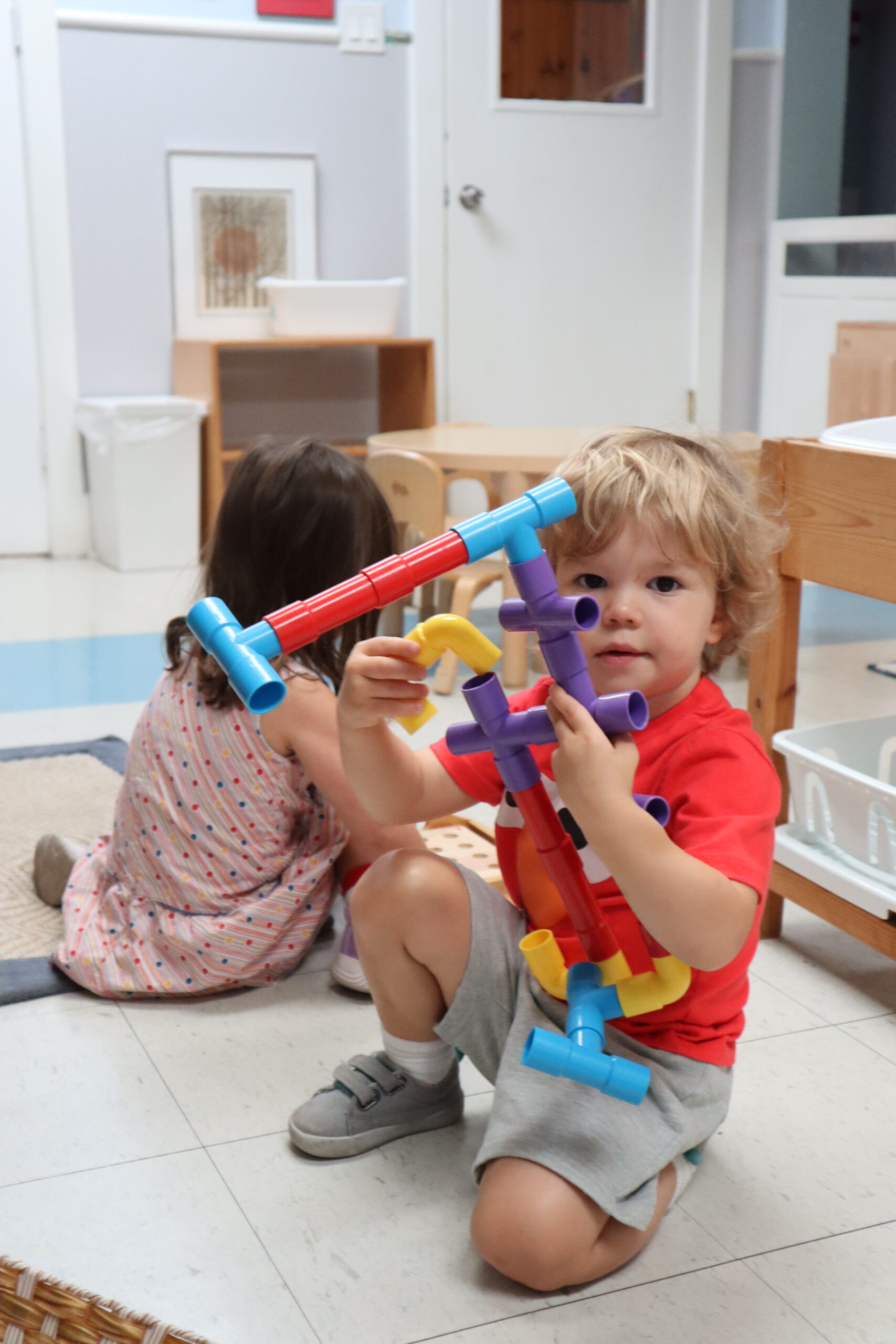
During the first three years of life, your child develops more rapidly than at any other time. Based on daily observations, Orientation teachers introduce engaging materials and activities that pique curiosity and stimulate learning. Learning objectives for your child at this age include:
- Language
- Concentration
- Problem-solving
- Visual discrimination
- Physical coordination
- Self-care and toilet learning
- Practical life, including pouring, sweeping, buttoning, setting the table, restoring the environment
- Social-emotional development, including learning and socializing with peers
Orientation celebrates the child’s first steps into a world designed to inspire curiosity, growth, and confidence. Carefully crafted indoor and outdoor environments encourage independent exploration, fostering both a sense of wonder and order. Classroom materials, thoughtfully rotated throughout the academic year, are not only self-correcting but also designed to provide enriching sensorial experiences. Our dedicated teachers gently guide students within the classroom, during outdoor walks, and in navigating expectations beyond the familiar home environment.
Learn more about Orientation at St. Stephen’s > Explore Orientation 15 months – 3 years
Primary: 3 – Kindergarten
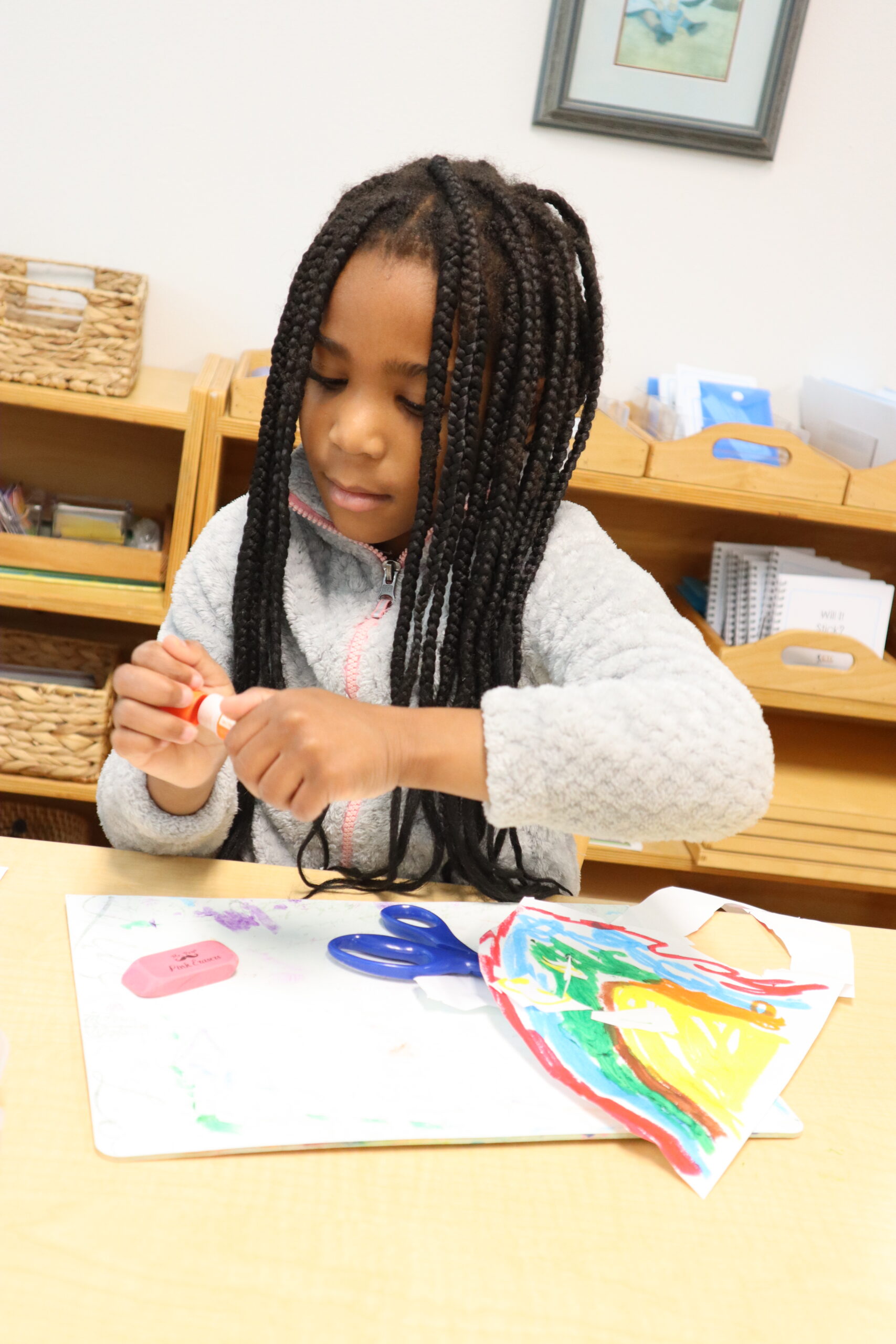
The Primary program encourages students to explore and discover, to collaborate with classmates, and to take ownership of their education. The Early Childhood classroom offers your child five areas of study: math, language, sensorial, cultural studies and practical life, as follows.
- Math: one-to-one correspondence, place value and the base-10 system, math concepts such as addition, subtraction, multiplication (skip-counting)
- Language: letter sounds, combining sounds to make words, building sentences, handwriting; reading skills and comprehension
- Sensorial: using different senses to classify, sort, and discriminate
- Cultural Studies: history, geography, science, art
- Practical Life: daily life skills; social skills and graces
- Specialist Classes: music, P.E., Spanish
- Specialist Classes (Kindergarten only): applied STEM in the da Vinci makerspace, art or music
Kindergarten is the culmination of the Primary program. Students exhibit the independence, critical thinking, teamwork, and leadership that they have been practicing during their previous years in the Primary classroom, exercising them independently as they prepare to transition into the Lower Elementary program. Kindergarten students enjoy specialist classes in art, music, and/or applied STEM in the da Vinci makerspace as well as Kindergarten-only field trips. Students in their second year and Kindergarten year benefit from small group instruction with their Montessori lead teacher in the afternoons.
Learn more about Primary at St. Stephen’s > Explore Primary 3 years – Kindergarten
Elementary: 1st – 6th grade
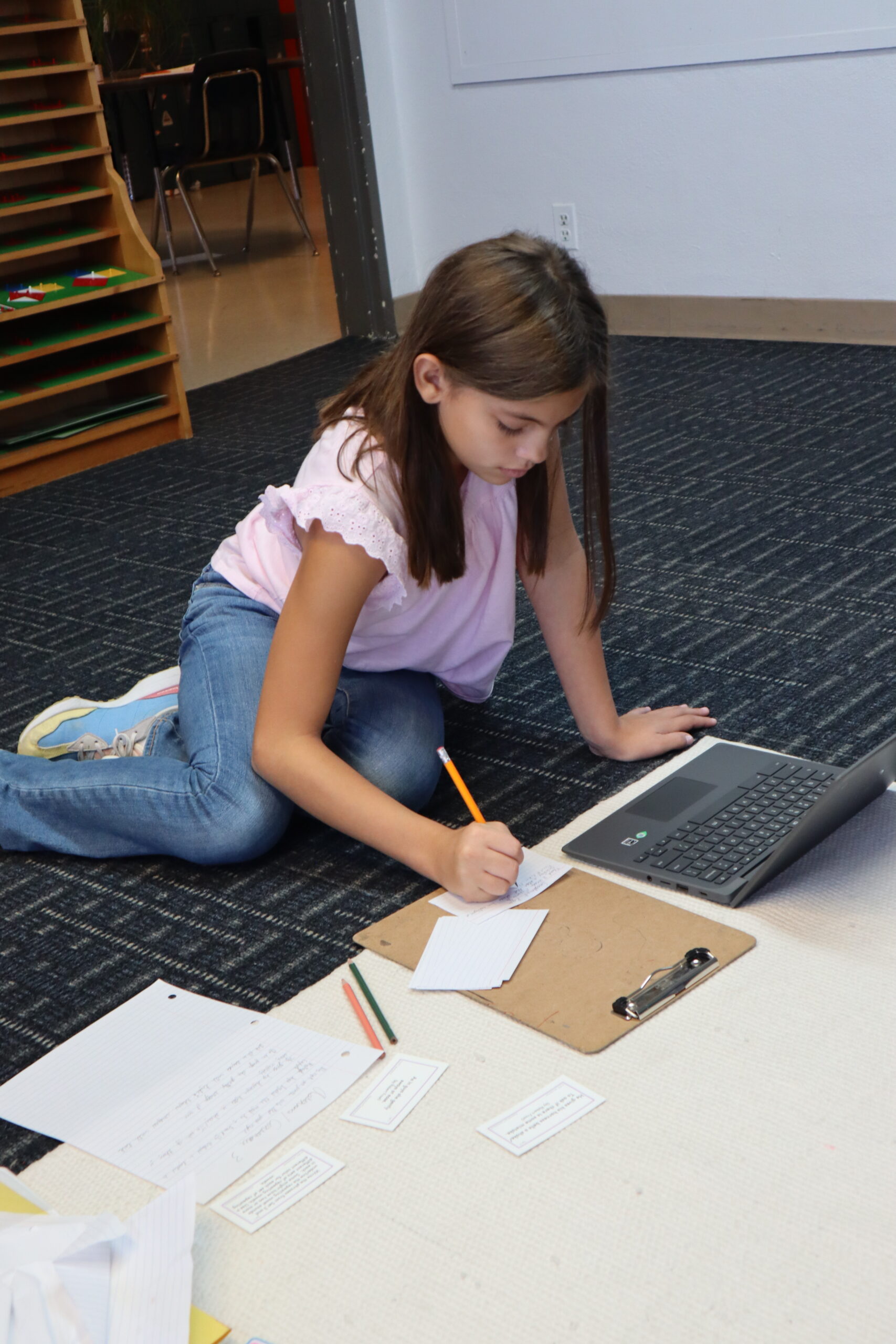
Lower and Upper Elementary each offer an individually paced curriculum that challenges your student academically and safeguards their well-being and sense of self. The Elementary curriculum contains the following areas of learning.
- Math: number concepts, place value, numerals, fractions and decimals, quantities; mathematical operations and complex functions (addition, subtraction, division, multiplication, geometry, pre-algebra)
- Language: spelling, mechanics of writing, grammar; penmanship and keyboarding skills; book clubs, literature, poetry, research, the written and spoken word in diverse forms; public speaking, advocacy and presentation skills
- Cultural Studies:
- physical and life sciences, including geology, zoology, botany
- history and anthropology, physical and political world geography, civics, economics, peace and justice
- Great Lessons, dramatic stories that explore the origins of the universe, our planet, and the continuous development of human advancement
- Practical Life: work plans, time management and organization skills, community meetings
- Specialist Classes: specialist classes in art, film (Upper Elementary), music, P.E., Spanish, applied STEM in the da Vinci makerspace
Elementary students look forward to overnight class trips to locations outside of Houston, such as Camp Allen, Camp Olympia, Nature’s Classroom, and more. Students hone their writing, research, and presentation skills at the annual Invention Fair (Lower El), Cultural Fair (Upper El), and Authors’ Night (Lower El and Upper El).
Learn more about Elementary at St. Stephen’s > Explore Elementary 1st – 6th grade
Middle Years: 7th and 8th grade
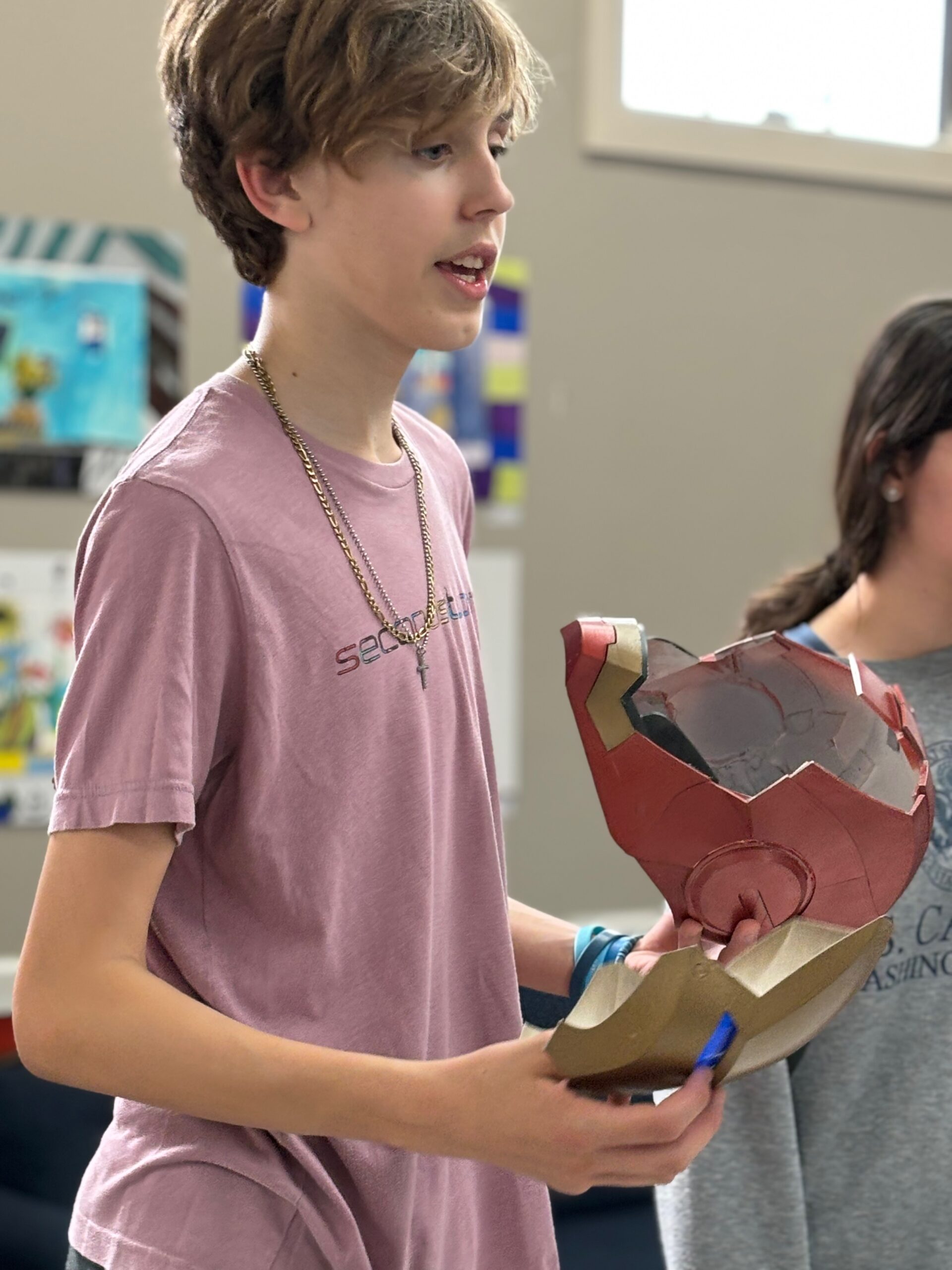
In Middle Years, your student will learn from an elevated curriculum that sparks curiosity and inspires them to reach their academic potential in the following areas.
- Math: math 7, pre-algebra, algebra (eligible for high school credit), and beyond
- Science: life science, physics, chemistry
- Language Arts: memoir, personal narrative, podcast, fiction, persuasive, drama, expository, nonfiction, research, poetry, creative writing, public speaking, vocabulary, grammar
- Humanities: US history, world history, world religions, world geography
- Personal Reflection: self-directed opportunities to engage daily in personal reflection, silent contemplation, meditation, reading for growth, journaling, gardening, and more
- Specialist Classes: film, music, P.E., Spanish, applied STEM in the da Vinci makerspace, visual arts
The Montessori Middle Years curriculum is meticulously crafted to offer a comprehensive and enriching educational experience. The program includes the following distinctive opportunities that shape a well-rounded learning journey.
- Micro Economy: Students engage in the conceptualization and operation of a business, fostering a genuine understanding of commerce and entrepreneurship.
- High School Preparation: Students actively participate in a two-year program designed to prepare them for high school and beyond. This comprehensive preparation includes high school counseling, ISEE exam readiness, the creation and refinement of portfolios, honing essay writing skills, and engaging in interview practice. Beyond academics, students acquire crucial life skills like time management, self-motivation, and organizational strategies. In our close-knit community, students cultivate leadership and advocacy skills within a safe and supportive environment.
- Off-Campus Learning: The Montessori Middle Years program includes day trips and overnight excursions, which are integral to building a strong community and enriching classroom learning. Emphasis is placed on providing students with direct experiences in nature, fostering a deep respect for the environment.
Learn more about Middle Years at St. Stephen’s > Explore Middle Years 7th and 8th grade
Specialist Classes
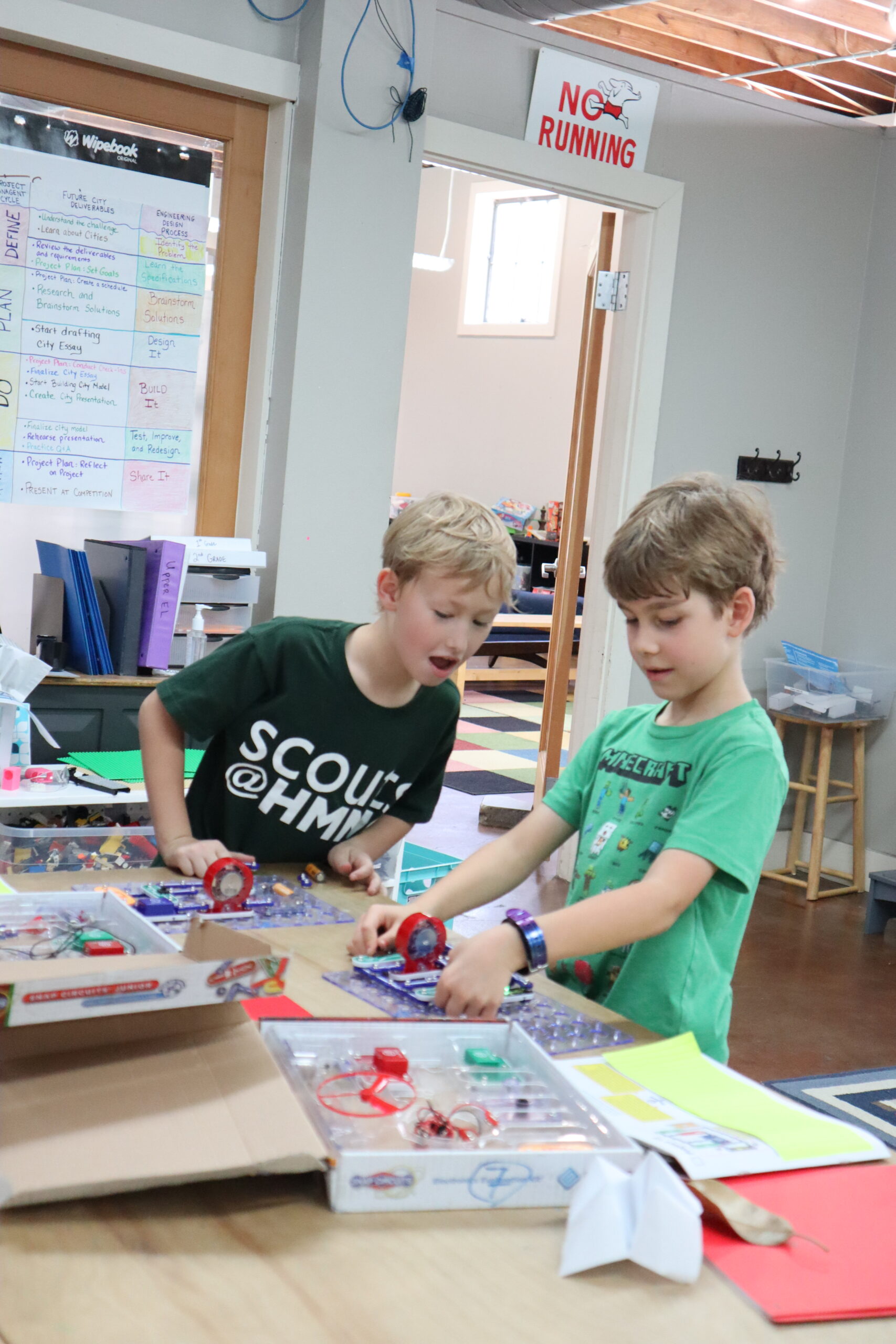
Project-based learning, innovation, and STEM combine in the da Vinci Lab for Creative Arts & Sciences. The diverse curriculum in the da Vinci Lab (after school) and the da Vinci Classroom (during the school day for Elementary and Middle Years students) includes core computing skills such as typing, internet safety, and basic coding; electronics, including motors, circuits, wearables, sensors, and coding; sewing featuring fabric design, cutting, and stitching; ceramics construction and finishing methods; 3D design, including slicing models and creating designs for 3D printing, 3D scanning, Mesh Mixer, and TinkerCad. Capstone projects include invention fairs, innovation projects, and the Future City competition. The da Vinci Lab is also home to St. Stephen’s Robotics program, which fosters engineering and design, creativity, computer programming skills, and teamwork.
The Fine Arts Program is fully integrated with the core curriculum; our students enjoy creative outlets to express their learning in culture, literature, history, math, and science. Through music, film, and visual arts, including photography, St. Stephen’s students give life and form to their creative ideas and share their talents in pop-up art shows, performances, and other special events.
Our Spanish Program begins in Orientation with an informal introduction to the language guided by bilingual teachers and assistant teachers. The Spanish curriculum begins in Primary and builds a strong foundation of language and culture. Spanish classes include puppets, props, storytelling, pictures, movement, songs, poems, fables, and rhymes. The Spanish curriculum emphasizes listening and comprehension in Primary and incorporates additional speaking opportunities in Lower Elementary. The Upper Elementary and Middle Years curriculum balances listening, speaking, reading, and writing. This comprehensive curriculum is designed to prepare students to excel in the Spanish National Exam and be well-rounded global citizens.
St. Stephen’s Athletics and Wellness Program encourages integrity and fair play. To this end, emphasis is placed on the experience of spirited competition and the development of healthy minds and bodies.
The Bulldog 360 after-school program is supplemental learning, vibrant classes, and fun community building — all happening after school hours. Read more on our Bulldog 360 webpage.
